Genre: Action Developer: Iguana Ent. Publisher: Sunsoft Players: 1 Released: 1994
I faintly remember the TV Show Pirates of Dark Water back when it had its initial run. I zapped into it while channel hopping one day. It was a rather typical adventurous Saturday morning Cartoon, and the scenario somehow stuck in my mind. It had seafaring adventure, a fantasy setting, and it concentrated on pirates – and boy, do I love pirate stories. However, even though the shows background somewhat caught my attention, I don’t remember actually seeing an entire episode. It may have been because it didn’t stick around very long – it ran from 1991 to 1993, and was canceled mid-season after twenty-one episodes.
Even though the concept stayed in my memory, the show in itself never really caught my interest. Why do I mention all of this? Because it shows that even though you have some good base ideas, and even though you get the setting right, doesn’t automatically guarantee a successful product. Even if you managed to shortly catch the audiences attention, it takes more to truly draw them in. (By the way, being released after the final episode of the show aired probably didn’t do the popularity of the game much good, either). And it also parallels the shortcomings of the game based on the series.
A lot of Saturday morning cartoons sold licenses to have video games made out of them, and even though this one didn’t last too long, it nevertheless got not only one, but two games made in the 16-bit era. The SNES version was entirely made by Sunsoft and was a decent side-scrolling brawler. The Genesis version, though also published by Sunsoft, was made by Iguana entertainment, and took an entirely different approach. So instead of a beat-’em-up, we get a platformer. To make things more interesting, however, decided to throw some extras into the mix that come close to being RPG elements but aren’t quite. Similar to the TV series, it has a number of ideas that seem good and interesting, but in the execution somehow fail to provide long-time entertainment.
For those who don’t know the back story of the series, the game goes to great lengths detailing it. The short version: The fantasy world of Mer is threatened by something called “The Dark Water,” a strange substance that’s slowly consuming the entire world. Our hero, Ren – secretly the heir of a lost kingdom – and his friends Tula and Ioz therefore head out to find the so-called treasures of rule, which may hold the secret to defeat this mysterious threat.
At the start of each level, you get to select your character. Collect ten watermelons, and you can summon your sidekick Niddler, a talking monkeybird (half monkey, half bird – seriously, that is their name!), allowing you to swap characters mid-level, providing a fresh character with a full health bar! The character selection is a nice but unfortunately rather useless feature. The characters sport the usual differences – Ioz is strong but slow, Thula fast but weak, and Ren holds the middle ground, but the balancing between the characters is off. Thulas faster speed actually causes you to run into enemies, and eliminating enemies with her takes longer than with the others. Combine that with the fact that jumps get harder to control the faster the character moves, and you quickly realize that the game becomes way easier if you just decide to stick with Ioz most of the time. His ability to take out most foes in one hit and his slow speed actually helps you avoid getting hit!
Before and even within each level, you often get several pages of text telling the story. This is a very nice touch towards those who kept up with the show, since you’ll see and meet a lot of locations and characters from the series. The problem is the presentation, since the story only progresses though walls and walls of text. This becomes a bit tedious after a while. And speaking of tedium, another nice idea executed poorly is the level design. You don’t simply have to just go through the level hacking through enemies until you reach the exit. Sometimes you reach a locked exit, and a nearby person gives you an assignment before you can continue. This not only provides an opportunity for some more back story, but could also lead to some interesting puzzles… in theory. In truth, the assignments are always the same: find a certain number of coins (always hidden in pots strewn all over the level), and be allowed to pass. This forces you to explore the level and smash pots until you can proceed to the next section of the stage. Encouraging level exploration is one thing, but forced item collecting, especially repeated forced item collecting, gets a bit boring after a while.
Items collected throughout the level (even health items if you got a full health bar) go directly to the inventory and can be accessed any time you please. Most items are potions granting you a certain amount of invulnerability. While this comes in pretty handy, it sometimes makes the game too easy. For example, every once in a while you get into a boss fight (again accompanied by an introductory wall of text). In theory these bosses follow a certain pattern you need to figure out in order to defeat them. In practice, however, all you have to do is down one potion after another, standing still, and whacking away, and you’ll defeat the bosses in no time.
Honestly, it seems that every principally good idea they put in Pirates of Dark Water also has a big downside. Falling off platforms doesn’t actually kill you; instead you lose some health, and you get transported back onto the platform from where you fell. However, enemies respawn as soon as you leave the screen, so pretty often it happens that you land next to an enemy when you get back up. When an enemy hits you, you get knocked back, and you immediately fall off the platform again! Wash, rinse, repeat. You can get out of such situations, but it happens way too often and is pretty annoying.
Does this make Pirates of Dark Water a bad game? Well no, not really. The graphics are decent and at times nice to look at, the music is okay (occasionally a bit bland for my tastes), and as long as you don’t dwell too long on it, you’ve got a platformer with some really nice ideas! For instance, every once in a while you get to choose which stage you want to tackle next, and while it doesn’t really change the game much (you still have to complete all the stages), it adds a bit of diversity.
Another plus is that after each level you get a password which is really helpful, not because the game is hard, but because if you only take it in in small sittings, only one stage at a time, the ideas appear a bit more fresh, and the feeling of tedium doesn’t set in, making it a game best enjoyed in small doses! It has a lot of good ideas that make it stand out of the masses, and with a little more effort this game could really have shone. It’s a bit of a shame to see so many inspirations fall so flat in execution. But somehow, this is another similarity the game seems to share with the cartoon series from where it originated.
SCORE: 6 out of 10

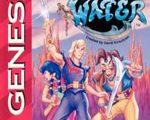
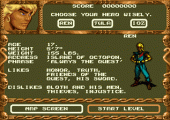
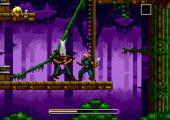
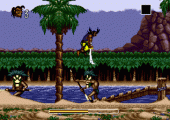
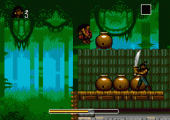
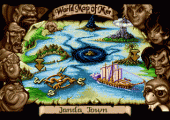
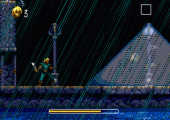
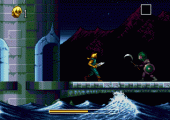
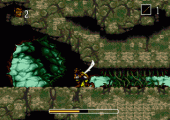
Recent Comments